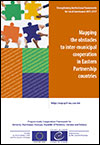Improving the quality of the services to citizens through inter-municipal co-operation (IMC)

IMC can offer a means to counter excessive fragmentation of local government units and is a priority for central and local authorities in countries implementing a territorial and decentralisation reform – in particular the countries from the Eastern Partnership.
The basic legal framework in those countries allows for IMC, nevertheless a lot more could be done in order to achieve good level of cooperation and to ensure efficient delivery of quality services to citizens.
IMC Country Studies
- General report: Intermunicipal cooperation: many ways, various models for strengthening local self-government
- Armenia: Study mapping the obstacles to intermunicipal co-operation in Armenia
- Azerbaijan: Study mapping the obstacles to intermunicipal co-operation in Azerbaijan
- Belarus: Study mapping the obstacles to intermunicipal co-operation in Belarus
- Georgia: Study mapping the obstacles to intermunicipal co-operation in Georgia
- Republic of Moldova: Study mapping the obstacles to intermunicipal co-operation in the Republic of Moldova
- Ukraine: Intermunicipal cooperation in Ukraine
- See also IMC-PGG webpage
Events





